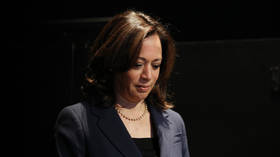Harris says US not ready for black woman president, but maybe even the Dems didn’t want more identity politics in a power suit

Kamala Harris withdrew from the race for Democratic presidential nominee after falling in the polls, disappointing liberal media, and running out of money. The botched campaign is a lesson in the limitations of identity politics.
Over the course of a campaign that was kicked off with an Oakland, CA. rally of an estimated 20,000 enthusiastic supporters, Kamala Harris's presidential run lost momentum as the candidate floundered in attempts to define a clear message and to distinguish herself as a viable challenger to Donald Trump – perhaps the most loathed president of all time among Democratic voters.
Harris stumbled on health care, half-heartedly defended her career as an attorney general of California, missed chances to debunk frontrunners, and finally proved unable to separate herself from the field of progressives on one side, and moderates on the other.
Also on rt.com Kamala Harris drops out of 2020 presidential election raceHarris entered a crowded field as a “top-tier” candidate. She could boast of being only the second black woman to become a US senator. She represented California, a Democratic stronghold and the nation's most populous state. Her political success and identity as a black woman even led some to dub her the “female Obama” – at the time the highest recommendation for a Democrat.
Harris gained ground in the first debate with an effective smack-down of former Vice President Joe Biden over the racially charged issues of student busing and Biden's earlier friendliness with racial segregationists. Post-debate numbers showed Harris soaring past Elizabeth Warren to second or third place, with the support of anywhere between 11 to 15 percent of registered Democratic voters. Some saw Harris as the Democrats' best chance to defeat Trump in 2020.
But the California senator's busing policies were soon called-out by critics, who noted that her stance was hardly distinguishable from Biden's. She had fumbled and missed an important opportunity to differentiate herself from the moderate frontrunner on the solid ground of racial politics, while she could have also maintained a safe distance from the economic progressives, including Bernie Sanders and Elizabeth Warren.
Striking back in the second debate, Biden pounced on Harris for her “double talk” on health care, attacking her ill-defined proposal, which called for the elimination of private insurance and came at a cost of $30 trillion a year. Biden then returned to the busing issue, challenging Harris for failing as California attorney general to make legislative attempts at desegregating the San Francisco and Los Angeles public schools. Biden also attacked Harris for her record as a draconian prosecutor who threw people in prison despite exculpatory evidence, which played poorly in a Democratic primary race that put a premium on social justice.
Harris also found herself fending off challenges from Rep. Tulsi Gabbard of Hawaii, a party outsider and critic of Democratic hawks like Hillary Clinton. This sparring could do little to help while potentially harming Harris.
Harris's slide in the polls continued through poor performances in subsequent debates, and with the slipping poll numbers she also lost the support of potential donors. New challenges to the moderate wing came from others, including Mayor Pete Buttigieg, and most recently, billionaire and former New York Mayor Michael Bloomberg.
The California senator and others have suggested that Kamala Harris paid a price for her identity as a black woman. But the prevalence of identity politics within the party, the two-term presidency of Barack Obama, and the fawning media that greeted Harris' candidacy suggest otherwise. In the end, Harris failed in her Democratic primary run in spite of her identity, not because of it. Kamala Harris's aborted campaign highlights the limits of identity politics in the absence of clear policies, soaring rhetoric, and compelling vision.
By Michael Rectenwald, author of nine books, including the most recent, Google Archipelago. He was Professor of Liberal Arts at NYU from 2008 through 2019.
If you like this story, share it with a friend!















